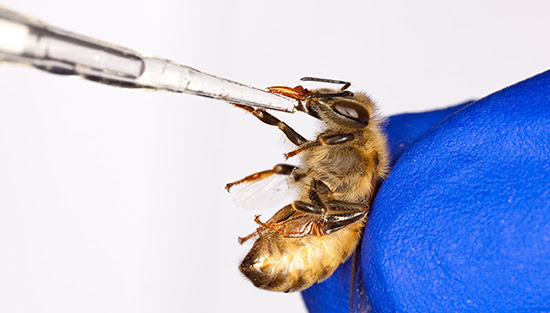Nov 29, 2021Solutions for honeybees’ health point toward natural products
The buzz about natural products is not just for humans.
The USDA, Agricultural Research Service (ARS) researchers from the Bee Research Laboratory in Beltsville, Maryland and collaborators found some natural products’ medicinal properties reduced virus levels and improved gut health in honeybees.
Among the study’s results, which were recently published in Applied Sciences, researchers found a significant reduction in virus levels in bees fed raw cacao and hesperidin, a plant chemical commonly found in citrus fruits and other fruits and vegetables.
There were also lower levels of viruses in bees fed chrysin, curcumin and vanillin. Chrysin is a chemical found in honey and various plants such as passionflower and silver linden. Curcumin is a bright yellow chemical produced by plants and is known for giving turmeric its distinctive color. Vanillin is a chemical compound of the extract of a vanilla bean and major flavor component of vanilla.
The results also showed that some natural products had positive impacts on bees’ gut health and immune response. For example, bees fed Vitamin E had significantly decreased levels of Gilliamella, a gut bacterium. In addition, there were also lower levels of Gilliamella in bees fed curcumin, vanillin and hesperidin.
While Gilliamella can be beneficial for honeybees, too much of the gut bacterium can negatively impact their health.
“Gilliamella is a common bacterium in honeybees – even healthy ones,” said Jay Evans, research entomologist for the Bee Research Laboratory.
A gut bacterial imbalance could be bad for bees. If Gilliamella levels are high, then Gilliamella could take the place of other core bacteria. If bee diets or treatments help maintain a good mix of ‘good’ bacteria in bees’ guts, then this seems to help strengthen their immune responses, according to the study’s results.
The 20 natural products used in the study included native extracts and individual compounds known to support immunity, have antiviral or antimicrobial properties, and/or control parasites and pests.
Scientists researched these natural products as possible safer, cost-effective alternatives to antibiotics and synthetic chemicals. Understanding these natural products’ effects can also help scientists determine better crops and flowers for bees’ diets.
“Many of the natural products tested are recognized as safe components of the food supply and are potentially less expensive to produce,” said Evans. “These results could also inform us on possible, healthier crops and flowers for bees. Bees foraging on crops or non-crop plantings of flowers that provide these benefits could naturally have better health.”
The Agricultural Research Service is the U.S. Department of Agriculture’s chief scientific in-house research agency.
– Jessica Ryan, USDA
Scientists at the ARS Bee Research Laboratory in Beltsville, Maryland, use the hand-feeding technique to deliver pathogens and medicines to bees. Photo: USDA















